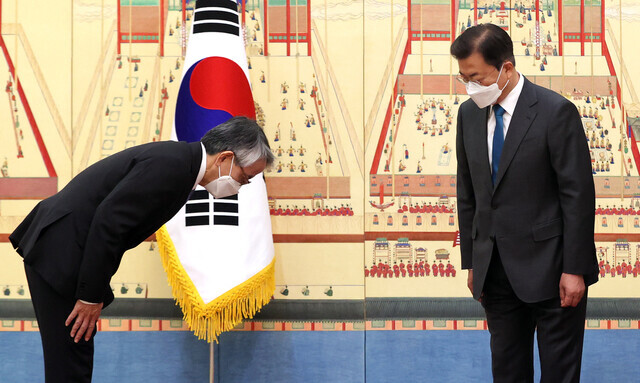hankyoreh
Links to other country sites 다른 나라 사이트 링크
[Editorial] Japan needs to take S. Korea’s concern seriously

After the Japanese government decided to discharge radioactive water at the Fukushima nuclear plant into the ocean, South Korean President Moon Jae-in instructed his government Wednesday to aggressively explore the option of appealing Japan’s decision to the International Tribunal for the Law of the Sea, along with taking an interim measure.
When Japanese ambassador to South Korea Koichi Aiboshi visited Moon on the same day to present his diplomatic credentials, Moon said, “There’s something I’m obliged to tell you. [Japan’s decision has aroused] very serious concerns in Korea, which is your closest neighbor and shares a sea with you.”
Despite South Korea’s rocky relationship with Japan, Moon made clear that he means to take firm action on an issue that could have a serious impact on the environment and public health.
The interim measure that Moon mentioned would be asking the International Tribunal for the Law of the Sea to issue an injunction preventing Japan from releasing the contaminated water until the tribunal can reach a final decision, a key official from the Blue House said.
Song Gi-ho, an attorney who specializes in international commerce, explained that South Korea could ask the tribunal for such an interim measure unless Japan carries out a scientific assessment of whether the contaminated water treated through the Advanced Liquid Processing System (ALPS) is safe for the environment and the human body, transparently releases that information to South Korea (given the potential harm that Koreans could suffer), and deliberates its plans with South Korea.
When the Japanese government decided Tuesday to release around 1.25 million tons of contaminated water into the ocean over the next 30 years after bringing the concentration of radioactive materials down to a safe level, it not only dismissed the objections of neighbors such as South Korea and China but also ignored the concerns and criticism of its citizens, including those in the fishing industry.
Japan has also engaged in irresponsible behavior since making that decision. A Japanese government agency came up with a cartoon character to promote the safety of tritium, which is a radioactive material, while Deputy Prime Minister Taro Aso said “even drinking that water wouldn’t be a big deal.”
It’s also regrettable that the International Atomic Energy Agency (IAEA) and the US have supported the Japanese government’s decision to release the contaminated water. Since the IAEA has been a leading proponent of the safety of nuclear power and depends on dues from the US and Japan, it’s increasingly doubtful whether it’s an objective judge of the safety of releasing the water.
It would be wrong for Japan to unilaterally go ahead with releasing the water despite the opinion not only of its neighbors but also of locals, who are likely to suffer the most damage. Japan needs to ensure that South Koreans can take part in the scientific assessment of the safety of ALPS-treated water and give them access to adequate information and opportunities for consultation.
We hope that the South Korean government will ask Japan for scientific verification and consultation as a signatory to the UN Convention on the Law of the Sea and make cool-headed preparations for lodging a complaint with the International Tribunal for the Law of the Sea if its legitimate requests aren’t accepted.
Please direct comments or questions to [english@hani.co.kr]

Editorial・opinion
![[Column] Has Korea, too, crossed the Rubicon on China? [Column] Has Korea, too, crossed the Rubicon on China?](https://flexible.img.hani.co.kr/flexible/normal/500/300/imgdb/original/2024/0419/9317135153409185.jpg) [Column] Has Korea, too, crossed the Rubicon on China?
[Column] Has Korea, too, crossed the Rubicon on China?![[Correspondent’s column] In Japan’s alliance with US, echoes of its past alliances with UK [Correspondent’s column] In Japan’s alliance with US, echoes of its past alliances with UK](https://flexible.img.hani.co.kr/flexible/normal/500/300/imgdb/original/2024/0419/2317135166563519.jpg) [Correspondent’s column] In Japan’s alliance with US, echoes of its past alliances with UK
[Correspondent’s column] In Japan’s alliance with US, echoes of its past alliances with UK- [Editorial] Does Yoon think the Korean public is wrong?
- [Editorial] As it bolsters its alliance with US, Japan must be accountable for past
- [Guest essay] Amending the Constitution is Yoon’s key to leaving office in public’s good graces
- [Editorial] 10 years on, lessons of Sewol tragedy must never be forgotten
- [Column] A death blow to Korea’s prosecutor politics
- [Correspondent’s column] The US and the end of Japanese pacifism
- [Guest essay] How Korea turned its trainee doctors into monsters
- [Guest essay] As someone who helped forge Seoul-Moscow ties, their status today troubles me
Most viewed articles
- 1[Column] The clock is ticking for Korea’s first lady
- 2Hong Se-hwa, voice for tolerance whose memoir of exile touched a chord, dies at 76
- 3After 2 months of delayed, denied medical care, Koreans worry worst may be yet to come
- 4[Column] Has Korea, too, crossed the Rubicon on China?
- 5US overtakes China as Korea’s top export market, prompting trade sanction jitters
- 6[Correspondent’s column] In Japan’s alliance with US, echoes of its past alliances with UK
- 7All eyes on Xiaomi after it pulls off EV that Apple couldn’t
- 8Samsung barricades office as unionized workers strike for better conditions
- 9[Photo] Smile ambassador, you’re on camera
- 10[Correspondent’s column] The US and the end of Japanese pacifism